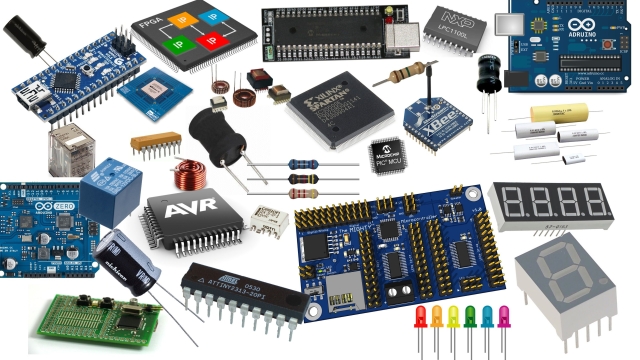
In the vast and ever-evolving world of technology, electronic components hold a place of paramount importance. These minute yet powerful building blocks are the backbone of countless electronic devices that have become indispensable in our daily lives. From smartphones to computers, from cars to airplanes, electronic components play a crucial role in shaping the way we live, work, and communicate.
At the core of electronic components lies a fascinating realm of innovation and engineering precision. Each component, whether a resistor, capacitor, diode, or transistor, is meticulously designed to perform specific functions within an electronic circuit. The intricate interplay of these components enables the seamless operation of electronic devices, transforming electrical signals into meaningful output that drives modern technology forward.
Types of Electronic Components
When exploring the realm of electronic components, it becomes evident that they can be broadly categorized into passive components, active components, and electromechanical components. Passive components, such as resistors, capacitors, and inductors, play a crucial role in regulating the flow of electrical currents within a circuit.
https://www.slw-ele.com
On the other hand, active components, including diodes, transistors, and integrated circuits, possess the ability to control the flow of current and amplify signals. These components are fundamental in enabling devices to perform complex operations and processes with precision and efficiency.
Electromechanical components bridge the physical and electrical worlds by converting electrical signals into mechanical actions. Devices like relays, motors, and switches fall into this category, showcasing the interconnected nature of electronic systems with the mechanical aspects of various applications.
Importance of Electronic Components
Having a deep understanding of electronic components is crucial in the field of technology. Electronic components serve as the building blocks of electronic devices, enabling them to function effectively. Without these components, electronic gadgets such as smartphones, computers, and home appliances would not be able to perform their intended tasks. Each component has a specific role to play in the overall functionality of a device, highlighting the significance of their individual contributions.
One key aspect of electronic components is their role in facilitating the flow of electricity within a device. By allowing the controlled movement of electrons, components such as resistors, capacitors, and transistors help regulate voltage levels and ensure that the device operates safely and efficiently. Understanding how these components interact with each other is essential for designing robust circuits that can withstand varying electrical conditions and provide consistent performance over time.
Furthermore, electronic components play a vital role in innovation and technological advancement. As new components are developed and existing ones are improved, the capabilities of electronic devices continue to evolve. From the miniaturization of components to the integration of advanced functionalities, the world of electronic components is constantly evolving to meet the demands of modern consumers. Keeping up with these advancements is essential for engineers and technology enthusiasts looking to push the boundaries of what is possible in the realm of electronics.
Future Developments in Electronic Components
In the exciting world of electronic components, advancements are continuously being made to enhance performance and functionality. One key area of focus for future developments is the miniaturization of components. As technology evolves, there is a growing need for smaller and more efficient components to power devices that are becoming increasingly compact and portable.
Another aspect that holds promise for the future of electronic components is the integration of more sustainable materials and manufacturing processes. With the rising awareness of environmental impact, the electronics industry is looking towards developing components that are eco-friendly and energy-efficient. This shift towards sustainability not only benefits the environment but also opens up new possibilities for innovation in electronic component design.
Moreover, the evolution of artificial intelligence and machine learning is set to revolutionize electronic components. With AI capabilities embedded in components, devices can become more intuitive and adaptive to user behavior. This development paves the way for smart components that can self-optimize and enhance overall system performance, leading to a new era of intelligent electronics.


